
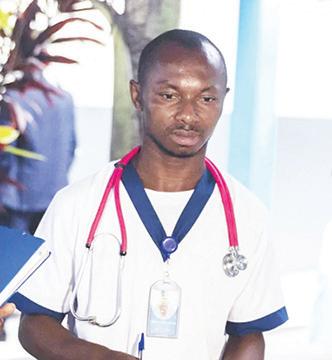










By Tom Gitaa Mshale
Representative Ilhan Omar beat back a primary challenge Tuesday from repeat rival former Minneapolis City Councilmember Don Samuels, this time with a wider margin than in 2022.
The district includes the entire city of Minneapolis and nine other surrounding suburbs. 15% of the 707,000 people that live in the district are foreign-born, according to Census data, with half of the foreign-born coming from Sub-Saharan Africa.
Ms. Omar defeated Mr. Samuels by garnering 56% of the vote to Samuels’43%, a convincing margin than happened in 2022 when Samuels came within two percentage points of defeating her.
“We had an opponent who was willing to align with literal Nazis in order to defeat us, that weaponized and scandalized my husband, and my daughter
and I hope they reflect on the shameful way that they decided to divide our district and the incredible people that we represent,” Ms. Omar said at an election night watch party.
Omar was first elected in 2018 to the open Fifth Congressional District seat formerly held by current Minnesota Attorney General Keith Ellison, making her one of the first Muslim women elected to Congress alongside Rashida Tlaib of Michigan. She overcame a Democratic primary in 2020 from the well-funded Antone Melton-Meaux, who raised millions of dollars, to return to Congress. In her reelection bid for a third term in 2022, she got a primary challenger again, this time from Don Samuels and narrowly beat him by just 2,466 votes.
Rep. Omar is a member of The Squad – an infor- mal group of progressive members of Congress. Pro- Israel groups like AIPAC recently poured millions of dollars to defeat two
members of the squad in their primary races, New Jamaal Bowman of New York and Cori Bush of Missouri, by backing their moderate challengers. Samuels, who considers himself in the same ilk as those who defeated Bowman and Bush, was not able to attract a similar cash trove in his bid to dislodge Omar.
Signs of an Omar win started becoming clear when pro-Israel lobby group, AIPAC, opted not to invest in the Omar-Samuels rematch, this after AIPAC boasted last week on its X account that 100% of the 104 Democrats it backed in this election cycle won their primaries.
After the 2022 scare, Omar took this year’s primary challenge seriously, spending heavily in advertising and get out the vote efforts, which included bringing Vermont Sen. Bernie Sanders to campaign with her.
She out raised Samuels considerably, posting very strong fund-raising numbers.
The nonpartisan Open Secrets nonprofit that tracks money in American politics, reported the Omar campaign had raised over $6.4 million in the current election cycle and had a cash on hand amounting to $1.8 million by the June 30 campaign finance filing required by law. Samuels on the other hand had raised $1.2 million in the same cycle and had 334,382 cash on hand.
As the campaign for the Fifth gained steam, Omar racked up major Union endorsements following her Party endorsement in May and a formal endorsement from the state party chair Ken Martin, including most of the mayors in her in district.
Speaking to an enthusiastic crowd at Nighthawks in south Minneapolis on Tuesday night at the watch party, Rep. Omar also thanked supporters for turning out in large numbers to defeat efforts by Republicans
By Kwot Anwey Mshale
Huldah Momanyi Hiltsley defeated Wynfred Russell in a hotly contested primary election that pitted two African immigrants fighting for the right be the Democratic candidate for District 38A of the Minnesota House of Representatives.
“I don’t even know where to begin,” Hiltsley said after a narrow win of 60 votes, amid cheers from her supporters, who had gathered for a victory party at MC’s Tap House in Brooklyn Park.
Hiltsley, who was born in Kenya, and Liberian-born Russell had each hoped to become the first immigrant from their respective countries to be elected to the Minnesota state House of Representatives. But first, the two had to fight it out for the right to bear the flag for Democratic Farmer-Labor (DFL), as the Democratic Party is known in the state, in the general elections in November.
In April, DFL delegates at the party convention could not come to a consensus on who to endorse. After two rounds of voting, neither Hiltsley nor Russell reached the 60% threshold required for a party endorsement. The candidates agreed to let voters decide in the primaries on Aug. 13. When all the votes were counted on Tuesday, it was Hiltsley who
finished at the top with 51.28 percent of the vote by garnering 1,005 votes to Russell’s 955.
“Somebody today asked me, ‘Have you gotten your two [victory and concession] speeches ready?’ I told him, no,” Hiltsley said.
Hiltsley said she didn’t write the speeches because she was busy knocking doors, working the phone bank, replying to text messages, and coordinating with her team to get the vote out.
“I told myself that regardless of what was going to happen tonight, it was going to be the same speech of gratitude, of being thankful, of, ‘Hey, we still have work to do,’” she said.
Winning the DFL primary moves Hiltsley a step closer to becoming the first Kenyan-born immigrant to be elected to any state legislature in the United States. That is because the nature of her district makes her the favorite to win in November against Brad Olson, who won the Republican nomination on Tuesday. District 38A, which includes the northern Minneapolis suburb of Osseo and part of Brooklyn Park, is a heavily Democratic constituency. Brooklyn Park is a minority-majority city, with people of color accounting for at least 55% of the population. People who identify as Black or African American account for more

than 29% of the population, making them the single largest minority group, according to data from the U.S. Census Bureau. African immigrants fondly refer to the city and neighboring Brooklyn Center as “Little Africa.” However, community leaders say the governance of the area doesn’t reflect the diversity of the population, prompting leaders like Hiltsley and Russell to enter politics.
Hiltsley is a first-generation Kenyan
immigrant, who has lived in Minnesota since she was 9 years old. She is an alumna of Robbinsdale Cooper School, and holds an impressive academic background, including three bachelor’s degrees and a master’s degree, all from Bethel University, with one of her degrees specializing in International Business. Her professional journey led her into the fields of data privacy and
District 38A
Cont’d on Pg. 8


In two years, we will celebrate our nation’s 250th birthday. Our great country has survived a Civil War, two world wars, a Cold War, and a plethora of legislative and judicial fits and starts in our pursuit of a “more perfect Union.” We have endured some devastating Supreme Court decisions, Dred Scott, The Slaughterhouse Cases, and Plessey v Ferguson, to name just a few. We have survived some oppressive presidencies, Andrew Johnson, Rutherford Hayes, and Woodrow Wilson, tantamount among them. Johnson attempted to nullify the impact of Abraham Lincoln’s Emancipation Proclamation. Hayes ended Reconstruction. Wilson’s policies towards federal civil service employment seem to be the foundation upon which a significant portion of Trump’s 2025 Project is built.
But eliminating civil service jobs is not the only devastating and oppressive policy proposed by Trump’s Project 2025. Project 2025 is a detailed plan to update the efforts of Johnson and Hayes to limit Black participation in our society, deny women freedoms over their own bodies, and deny association and nuptial rights to our LBGTQ+ community. Trump’s Project 2025 is a radical agenda that would – among other things – eliminate the Department of Education, zero out federal funding to low-income schools, and end the Public Service Loan Forgiveness (PSLF) Program. As Maya Angelou admonished, “When people tell who they are, believe them the first time.” The PSLF Program became effective in the first year of Trump’s Presidency and in his entire four years, only 7,000 public servants benefited from the program. In the three-and-one-half years of the Biden-Harris Administration, nearly 1 million teachers, firefighters, police officers, and other public servants have received over $69 billion in student debt relief.
Trump’s Project 2025 would also eliminate the requirements for the Equal Employment Opportunity Commission to collect racial data on employment, making it hard to determine where disparities and gaps persist. Further, the plan would end disparate impact liability, making it harder to bring a case of employment discrimination.
Trump’s Project 2025 would remove diversity, equity, and inclusion (DEI) from all federal laws and regulations and shut down DEI offices across the federal government. Project 2025 would make it harder to organize or be represented by a union. In sum, coupled with recent Supreme Court decisions on presidential immunity, the weakening of the Voting Rights Act, and the elimination of
affirmative action, Trump’s Project 2025 represents less freedom for a growing majority of Americans and more favor for a privileged few. In short, Trump’s Project 2025 is Jim Crow 2.0.
Although Trump has repeatedly tried to distance himself from Project 2025, it is hard for him to do so when six of his former Cabinet secretaries, four individuals he nominated as ambassadors, his first deputy Chief of Staff, and 140 individuals who worked in his Administration all had a hand in crafting the document. And dozens more were contracted to advise on Project 2025, including his former Chief of Staff Mark Meadows and longtime advisor Stephen Miller.
I remember when my parents were able to cast their first effective vote. I remember segregated lunch counters and “separate but (un)equal” schools. I do not want my grandchildren to grow up in a country like the one my parents and grandparents experienced.
During the stormiest days of the Revolutionary War, Thomas Paine, an English immigrant and critic of slavery, wrote in his little Pamphlet, The American Crisis No. 1:
“These are the times that try men’s souls. The summer soldier and sunshine patriot will in this crisis shrink from the service of their country; but he that stands by it now, deserves the love and thanks of man and woman. Tyranny, like hell, is not easily conquered; yet we have this consolation with us, that the harder the conflict, the more glorious the triumph.”
Thomas Paine’s words are as apropos today as they were in 1776. Storm clouds are forming, and current conditions are not conducive for fair-weather friends. Trump’s Project 2025 represents the reincarnation of “Jim Crow,” and defeating “Jim Crow 2.0” requires the participation of “soldiers and patriots” who are willing to fight in stormy as well as sunny times.
Congressman James E. Clyburn is the U.S. representative for South Carolina’s 6th congressional district since 1993. He was awarded the Presidential Medal of Freedom by President Joseph R. Biden Jr., on May 3, 2024.

By UN News
The chief of the World Health Organization (WHO) declared that the rise in mpox cases constitutes a public health emergency of international concern (PHEIC), following advice from members at Wednesday’s International Health Regulations (IHR) Emergency Committee meeting.
A PHEIC is the highest level of alarm under international health law.
The WHO Director-General, Tedros Adhanom Ghebreyesus, called for the meeting last Wednesday to seek advice on whether the mpox – previously monkeypox – outbreaks are cause for international concern.
On Tuesday, Aug. 13, the Africa Centres for Disease Control and Prevention (CDC) declared the situation a public health emergency.
“The Emergency Committee’s advice to me, and that of the [Africa CDC], which yesterday declared a public health emergency of regional security, are aligned,” Tedros said in a post on the social media platform X, formerly Twitter.
Clades and cases
Mpox cases have been spreading throughout many countries in Africa, particularly the Democratic Republic of the Congo (DRC) and neighbouring Burundi, Kenya, Rwanda and Uganda. The potential for further spread in Africa is worrying, said the WHO chief.
“In addition to other outbreaks of other clades of mpox in other parts of Africa, it’s clear that a coordinated international response is essential to stop these outbreaks and save lives,” Tedros said. This year already saw over 14,000 reported cases of the virus with 524 deaths, a significant increase in reported cases from 2023.
Tedros previously mentioned that the mpox outbreaks have occurred due to different viruses called clades.
At Wednesday’s meeting, he said there was transmission of the so-called clade 1b virus in the DRC last year which was caused “mainly through sexual networks”. This clade is reportedly deadlier and more easily transmitted from person to person.
Clade 1 has been circulating in the DRC for years while clade 2 was responsible for the global outbreak of 2022 which was declared an international public health emergency.
Tedros said in the past month that around 90 cases of successor clade 1b were reported in countries neighbouring the DRC which had not reported mpox cases before.
“Stopping these outbreaks will require a tailored and comprehensive response, with communities at the centre, as always,” Tedros said.
The WHO chief said the UN agency is working with governments of the affected countries, the Africa CDC and other partners to “understand and address the drivers of these outbreaks”.
“For example, we are providing machines to analyse blood samples and confirm cases of mpo [and] supporting laboratories to sequence viral samples,” he said.
He further mentioned “supporting case investigation and contact tracing” on the ground, training for health care workers and much more.
“WHO has developed a regional response plan, requiring an initial $15 million to support surveillance, preparedness and response activities,” Tedros said.
This response was funded by $1.45 million from the WHO Contingency Fund for Emergencies.
Last August, the WHO chief released standing recommendations under the IHR to monitor mpox cases. These recommendations were set to expire in five days, on 20 August 2024, but will be extended for another year to “support countries to respond to the chronic risk of mpox”.
Some of the recommendations include enhancing community protection through adapting public health and social measures to local contexts, providing guidance and resources for delivering clinical mpox care and more.
Tedros said WHO is “committed in the days and weeks ahead to coordinate the global response, working closely with each of the affected countries and leveraging our on-the-ground presence to prevent transmission, treat those infected and save lives”.
Supporting African countries to scale up response

Mpox – formerly monkeypox - is a viral disease that can be transmitted through physical contact with an infected person, animal or contaminated objects. It was first detected in humans in 1970, in the DRC, and is considered endemic to countries in Central and West Africa. Outbreaks are caused by different mpox viruses called clades, and the clade 1 strain has been circulating in the DRC for years.
The emergence of a new offshoot –clade 1b - and its rapid spread, including to nearby countries, is among the main reasons why WHO declared on Wednesday that mpox constitutes a public health emergency of international concern (PHEIC).
So far this year, more than 2,100 laboratory confirmed cases of the disease, and 13 deaths, have been reported in the DRC and 11 other countries: Burundi, Cameroon, Central African Republic, Congo, Côte d’Ivoire, Kenya, Liberia, Nigeria, Rwanda, South Africa and Uganda. This compares to 1,145 confirmed cases, and seven deaths, in 11 countries for all of 2023.
WHO is stepping up support to the affected countries by deploying additional experts, including epidemiologists and anthropologists, and providing initial funding to accelerate outbreak response measures.
Efforts are underway to enhance crossborder collaboration for case investigation, contact tracing and community engagement to ensure compliance with preventive measures.
The UN agency is also assisting national regulatory authorities to speed up regulatory approvals, as well as providing guidance to national immunization technical advisory groups to ensure readiness for vaccine rollout.
More funds will be released in the coming days and the WHO chief is also appealing for more donor support.
Currently, two WHO-recommended and approved vaccines are being used to combat the mpox virus outbreak.
Under an Emergency Use Listing (EUL) call last week, Tedros also invited manufacturers of mpox vaccines to express interest in producing them to “accelerate vaccine access for lower-income countries which have not yet issued their own national regulatory approval”.
EUL will allow partners like the UN Children’s Fund (UNICEF) to gather vaccines for distribution.
“We are working with all partners to facilitate equitable access to diagnostics, vaccines, supplies for clinical care and other tools,” Tedros said.
Meanwhile, WHO is supporting African countries to scale up response to curb mpox, which is now an international global health emergency.
The outbreak that affected the Democratic Republic of the Congo (DRC) and spread to neighbouring countries continues to grow.
On Thursday Aug. 15, WHO member Sweden became the first country outside Africa to record a case of the mpox Clade 1 variant that is believed to be driving the latest outbreak.
“We are hard at work on the frontlines of the response, collaborating closely with governments and communities to strengthen mpox control measures and are ramping up efforts to curb the widening trend of the virus through coordinated action with partners and national authorities,” said Dr. Matshidiso Moeti, WHO Regional Director for Africa.
WHO has also begun the process for Emergency Use Listing (EUL) for mpox vaccines, which will accelerate access for lower-income countries which have not yet issued their own national regulatory approval. EUL means that partners such as Gavi, the Vaccine Alliance, and the UN Children’s Fund (UNICEF) will be able to procure doses for distribution.
WHO is also working to strengthen national diagnostic capacities by providing testing kits, and reagents, as well as machines to decentralize testing. Genomic sequencing is also ongoing to determine the mpox clades.
To enhance preparedness in countries neighbouring the DRC and those at risk, disease surveillance and training of frontline health workers is being increased, along with public awareness campaigns.
to vote in the Democratic primary to defeat her.
“We would not have been able to overcome the Republican effort to influence our primary without the help of the mayors,” she said, to loud cheers.
Mr. Samuels issued a statement after his second defeat to Rep. Omar that said he believes the results showed “are hungry for a different approach to leadership.”
“Taking on an incumbent, let alone a party-endorsed incumbent, with a national fundraising base is a
Herculean task,” said Samuels in his statement.
Rep. Omar’s primary win makes her the highly favored candidate to win in November – as it has been 64 years since the district last elected a Republican.
Omar will face Republican challenger Dalia Al-Aqidi in the Nov. 5 general election. Al-Aqidi ran unopposed in Tuesday’s Republican primary receiving 3,380 votes. By comparison Rep. Omar received 67,920 votes to Samuels’s 51.839. Two other candidates in the Democratic primary, Abena McKenzie and Nate Schluter each received less than one percent of the vote.
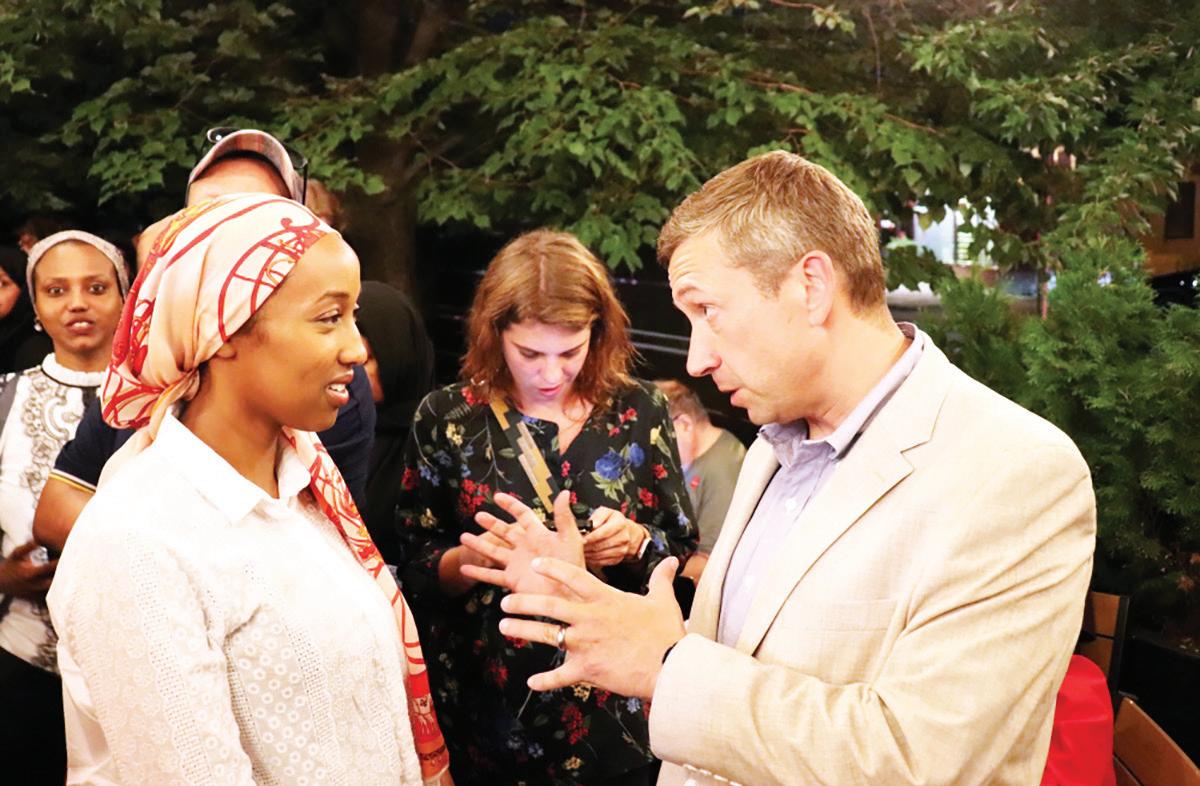
No monthly premium. No copays for covered medical, prescription drugs and dental.
Plus, more than 30 extra benefits like these*
• Animatronic pet: dog, cat or bird
• Fresh produce home delivery
• Electronic tablet with well-being tools
HealthPartners® Minnesota Senior Health Options (MSHO) (HMO SNP)
Call 877-778-7898 (TTY 711) to find out if you’re eligible.
Oct. 1 to March 31: 8 a.m. to 8 p.m. CT, seven days a week; April 1 to Sept. 30: 8 a.m. to 8 p.m. CT, Monday through Friday.


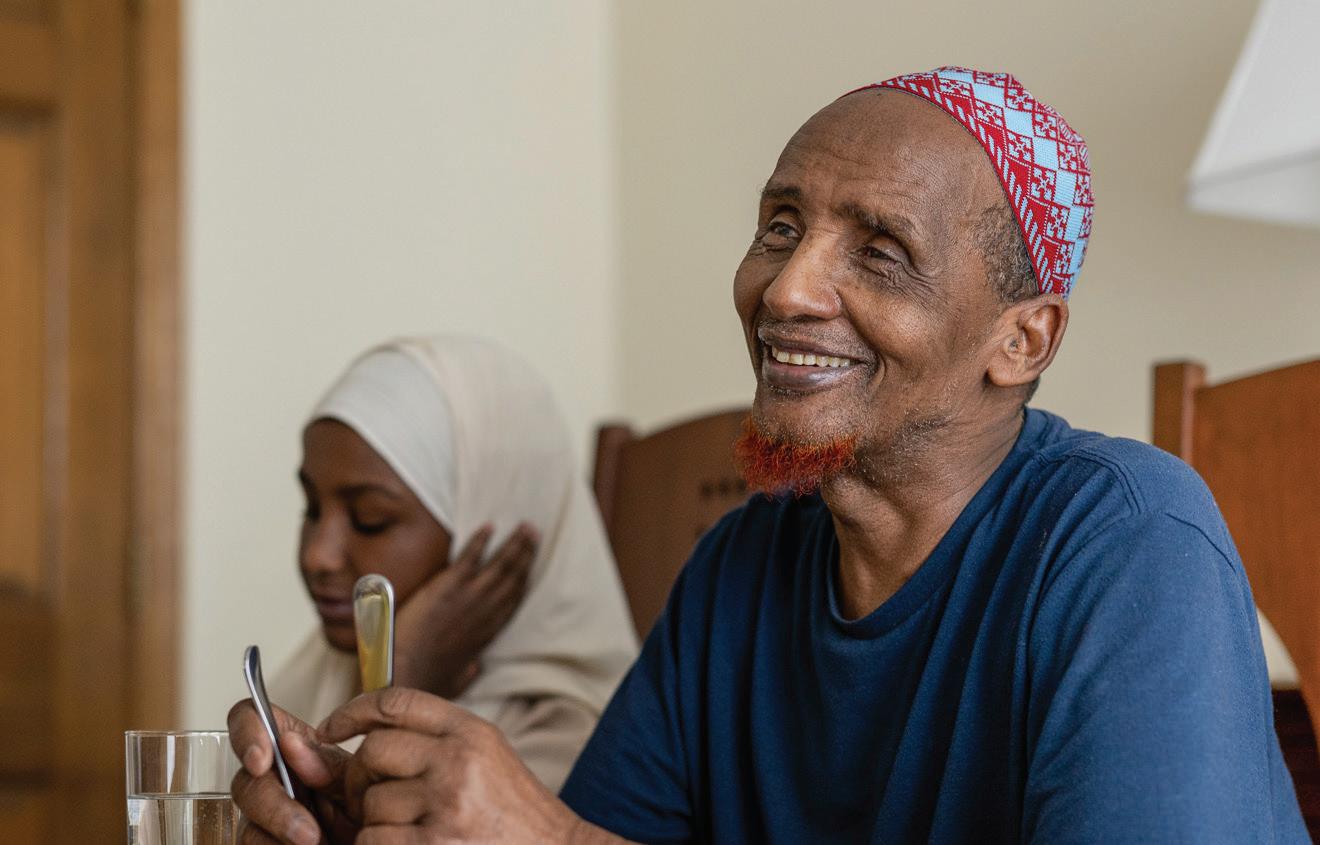

877-713-8215 TTY 711
mshosales@healthpartners.com
*Available to members with specific diagnoses who meet eligibility criteria. HealthPartners is a health plan that contracts with both Medicare and the Minnesota Medical Assistance (Medicaid) program to provide benefits of both programs to enrollees. Enrollment in HealthPartners depends on contract renewal. Available in 12 Minnesota counties. 23-2410552-2436301 (6/24) © 2024 HealthPartners
H2422_003396_M Accepted 8/5/23


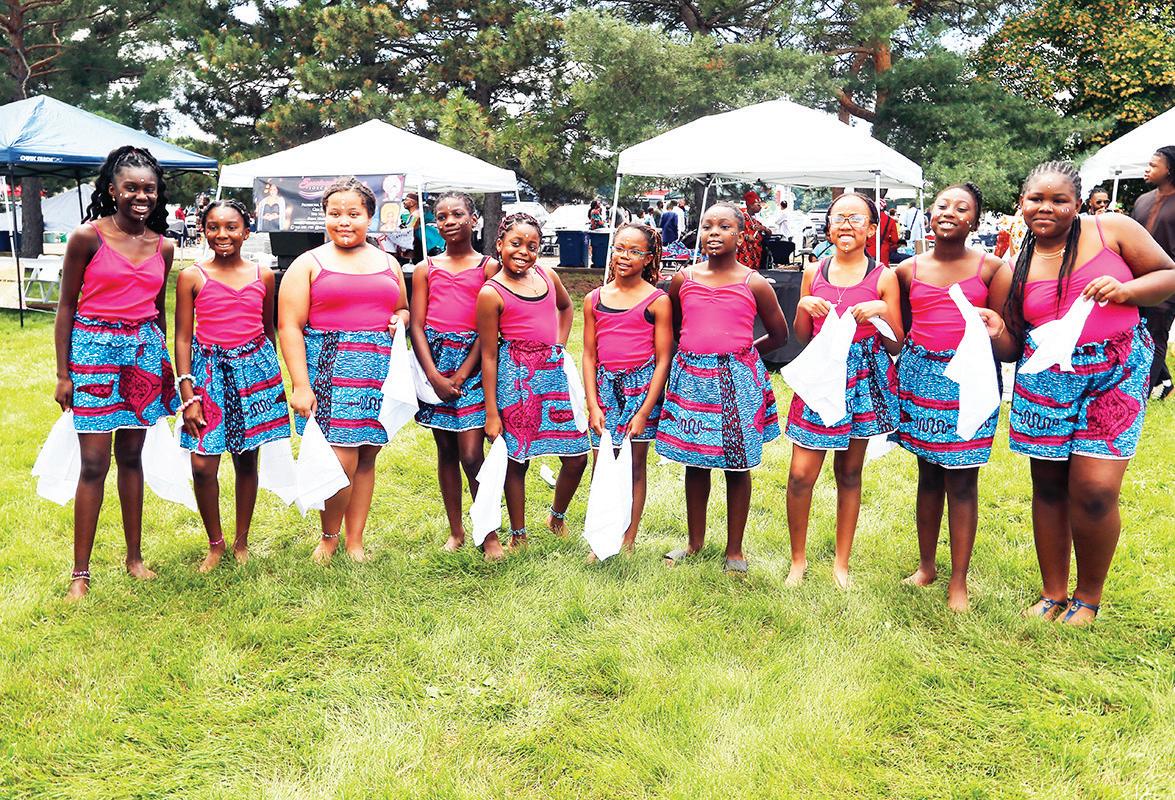
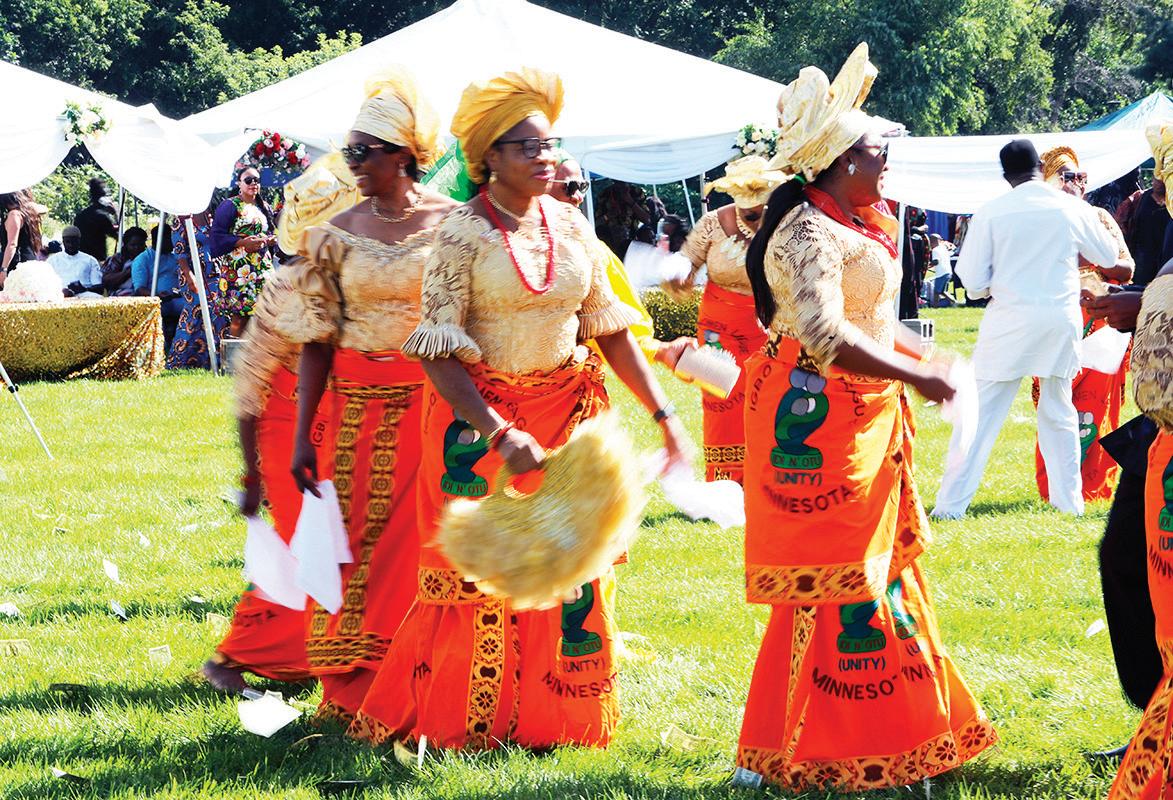
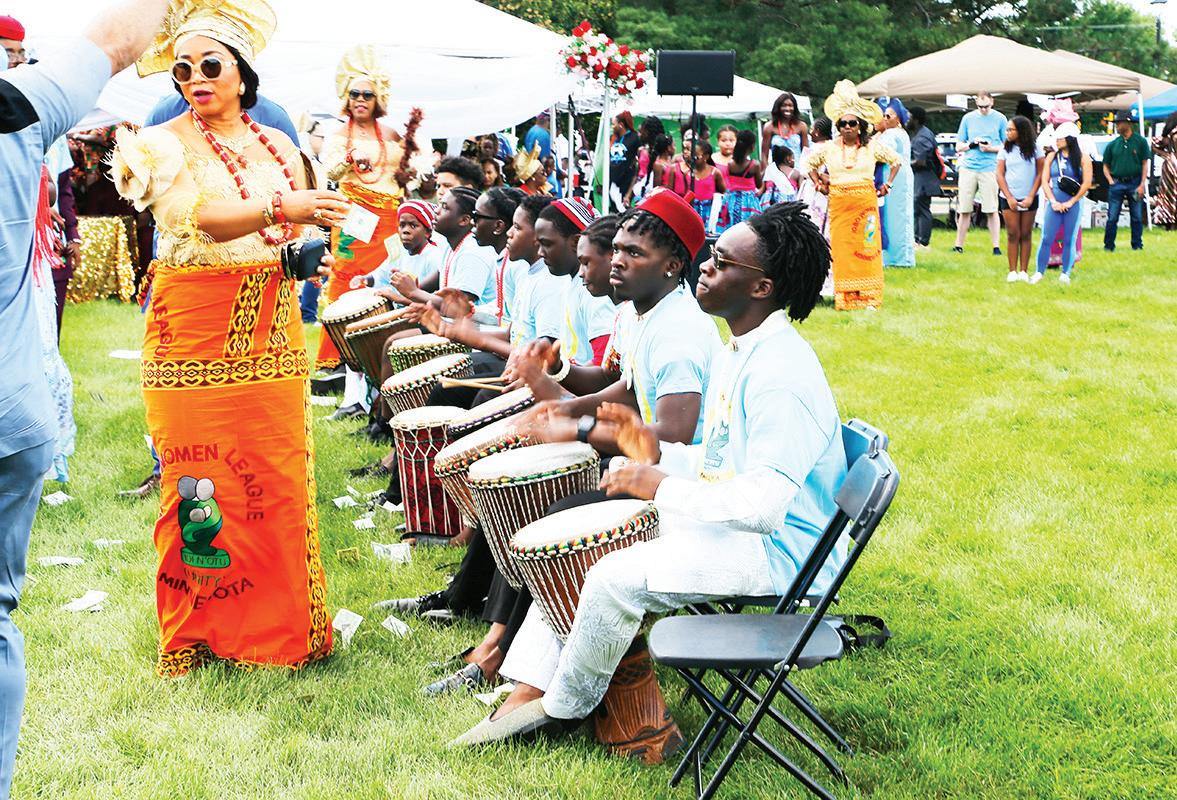


By Kwot Anwey Mshale
Umunne Cultural Association celebrated its 29th annual IgboFest, a festival that brings together business owners and performers from the Nigerian American community to celebrate Igbo culture.
The festival, which had the theme of “preserving our culture,” took place on Aug. 10 on the grounds of North Hennepin Community College in Brooklyn Park.
“Nigeria is a big body divided with all these [ethnic groups], but wherever we meet ourselves, I don’t want to ask you, ‘Are you Igbo? Are you Yoruba?’’ said Layo Carew, a vendor and owner of Pure Heart. “[I ask, ‘Are you Nigerian?’ Then I get excited. I’m not Igbo but at least I’m learning their culture.”
Established in 1985, Umunne Cultural Association is a nonprofit with a focus on Igbo culture. The annual festival is meant to unite Igbos across Minnesota, but all people regardless of ethic or racial background were invited to enjoy the festivities.
In her opening address to hundreds of attendees, Umunne President Dr. Jane Nwaudo emphasized the important connection the Nigerian immigrant community has to the suburban city of Brooklyn Park, dubbing it the cultural “capital city.” Nwado that even though Igbos of her generation already know their culture, it was important to make sure their descendants do not forget.
“We’re trying to preserve our heritage because we’re growing older, and the younger ones are coming up,” Nwaudo said. “They need to know our culture and how things happened back home.”
In 2019, Gov. Tim Walz of Minnesota officially proclaimed Aug. 10 Igbo Day in recognition of the community’s significance. For the first time in its existence, Umunne received cultural expression grant from the state.
In this year’s IgboFest, about a dozen food trucks lined the parking lot and emitted a fusion of smoke that filled the air with a rich aroma of the food they served, including fish rolls, suya, egusi soup, puff-puff, fried plantain, jollof rice, fried yam, and other delicacies. Katie Burns said she came to the festival after hearing about it from a local cooking and recipes Facebook group.
“I think any time you have an opportunity to come out and learn and expand and take in new cultures and food, es-
pecially having that intersection of culture and culinary, I think that’s a really special thing,” said Burns. “I think here in the Twin Cities, there’s a lot of people that get excited, and that’s kind of that entry point for them learning about different backgrounds and cultures, is through food.”
About 20 vendors at the festival bordered the perimeter of the college’s main lawn, selling several items like handbags, waist beads, and geles imported from West Africa. A couple vendors offered vegetables, spices and herbs that may be difficult to find elsewhere.
For Nneke Onume, a vendor and owner of Sweet Heavens by Nne, IgboFest was about more than selling her desserts. It was reflective of the creation of community outside Nigeria, she said.
“Everyone’s speaking a language I understand, and people are comfortable,” said Onume. “We’re in Minnesota, far away from home, but this is our home away from home. So, this is really special because, again, we’re able to proudly showcase who we are, and so that the Twin Cities knows that we are here.”
A dozen white tents with rows of chairs underneath circled the field, effectively creating a main stage in the lush grass. Gold sequined tablecloths served as a backdrop for the many dance and music groups that performed in the center of it all. Young men shook juju rattles and struck drums and cowbells, and young women presented their choreographed dances. Between acts, children rushed to the middle to pick up cash tips given to performers and gathering it into bags.
“I grew up in Nigeria,” said Onume. “I had the opportunity to be able to be in the environment and have that influence who I am today.”
However, she said, all her children were born here in the United States and don’t remember, or are not as connected to Nigeria, which is why it was important for those in her community who still have that connection to pass on the culture to their children.
Favor Osuorji, who has been attending the festival since she was 4 years old, said that because she wasn’t born in Nigeria, the event was this is the closest I’ll get to learning about and retaining her heritage.
“Being able to see how beautiful our culture is, and how our younger generation, Gen Z, is starting to become more involved, it’s so beautiful,”
Osuorji said.


Performing live in Minnesota for the
time in
years!


& Treaty The Cedar Cultural Center Presents The Global Get-Together | Corey Medina & Brothers First Avenue Goes To The Fair Grupo Esplendor Norteño | International Reggae All Stars | L.A. Buckner & BiG HOMiE
Tropical Zone Orchestra | Alma Andina | DiaToti
iLLism | Kazual | LAAMAR | Los Texmaniacs
Mariachi Campanas de America
Maurice Jacox & We Still R | The Men of Motown
Native Pride Dancers | New Primitives
Pan Dimensions Rumba Nueva
Terrance Simien and the Zydeco Experience
Thomasina Petrus & The King’s Quartet
Alléz-OOPS! Circus. Comedy. Spectacle. Kidsdance | Monster Shop Bump’n



data protection, but she said her true calling was community advocacy to address the needs of all residents. She is the immediate former president of Mwanyagetinge, a community organization of Kenyans living in Minnesota.
Hiltsley’s win ends a heated contest that began as soon as both candidates entered the race. The tensions heightened on the day of the primary election. Hiltsley ran around her house hours before polls closed, making phone calls to campaign staff and voters while her campaign manager worked the phones, attempting to reach loyal supporters and people who have voted in the last five primaries. Later, utilizing data from the Secretary of State’s voter registration system, Hiltsley herself went door knocking.
“The goal for our team was to make sure that our strategy was comprehensive of the diversity that really is reflected in this district, which is the most diverse district in the whole entire state of Minnesota,” she said. “We wanted to make sure that we reach each community and really address some of the challenges that we’ve seen in terms of voter turnout.”
Clearly her efforts paid off, as more people turned out to vote for her. One voter, Kelly Richards,
said she voted for Hiltsley because of what the candidate’s slogan of “Stronger Together”represents.
“Diversity is what makes America unique,” Richards said. “This is what makes us strong, and this is what will move us forward. Huldah has a great spirit and she’ll do great things in representing Brooklyn Park at the state level.”
Before deciding to enter the race for the House seat, Hiltsley ran for nomination as the DFL’s candidate for District 38 of the state Senate seat but lost to Susan Pha, a Brooklyn Park City councilwoman, who went on to win against Republicans. This year, she found herself yet again running against another savvy candidate, who like Pha had immense experience running a successful election campaign.
Born in Liberia, Russell came to the United States in 2005 as a refugee student on a scholarship. He received a master’s degree in international and global studies from Northern Michigan University upon which the University of Minnesota recruited him to work as a public health researcher at the Center for Infectious Disease Research and Policy (CIDRAP). Upon arriving in Minnesota, he settled in New Brighton and started his life in academia.
of going seeking re-election in 2022, he opted to run for Mayor of Brooklyn Park but lost to current Mayor Hollies Winston.
The atmosphere at Russell’s watch party on Tuesday night appeared tense and restless. Longtime friends and supporters of Russell’s greeted each other and caught up in the Organization of Liberians in Minnesota’s community room as they kept refreshing the Secretary of State’s website for election results. They included former Brooklyn Park Mayor Lisa Jacobson and Osseo School Board candidate Tekoa Cochran. When Russell finally entered, the mood lightened.
“It’s a nail biter,” Russell said, and his supporters laughed. “I’ve been down this road before. I ran for city council, and I lost by five votes one time. The key to this race was voter turnout, coming out and turning out every vote and ensuring that everyone shows up and participates in the process.”
But as more results continued to come in, the space fell quieter and quieter. Russell supporter and campaign volunteer, Michael Blidi, told Mshale that given the large number of Liberians in the district, it didn’t make sense that Russell would be trailing by 47 votes.
community that got connections with other people, and I don’t think those people were used to reach out to other people.”
With only a 2.4% difference separating the candidates, Russell’s campaign said it was within its rights to hold a publicly funded recount. But when the final tally was made official, the gap had grown to 2.56%, meaning that Russell’s campaign will have to pay for a recount, if he asks for one. “I don’t feel that good, but I would say it’s not bad,” said Russell campaign supporter and volunteer, Vicky Sendolo. “I don’t know why it must always be this close… that’s one reason I believe in [him] so much, because he did it the last time. He came close, he tried again, so it’s always good to try again. All these things is a part of [his] success story. If you don’t have this moment, then you have nothing to talk about.”
As the results suggest, the hotly contested effort to determine who will be District 38A’s DFL candidate for the House seat has divided Democrats in the district down the middle. Having emerged as the winner, Hiltsley now faces a huge task of uniting the party and the African community to ensure victory in November.
Jasmine Webber contributed to this story. More photos from election night @ mshale.com District
In 2018 Mr. Russell became the first Liberian American elected to the Brooklyn Park City Council, where he served one term. Instead
“Something did not go right, so maybe next time, we [should] do a better job reaching out to Liberians, door-to-door, grassroot,” Blidi said. “There are people in this
Mshale Photojournalist

By Jack Jenkins Religion News Service
A diverse group of Christians is throwing support behind Vice President Kamala Harris’ White House bid, organizing fundraisers and Zoom calls in hopes of helping catapult the Democrat to victory in November — and, they say, reclaiming their faith from Republicans in the process.
Their efforts come on the heels of similar campaigns aimed at specific constituency groups, such as the recent “White Dudes for Harris” Zoom call that featured celebrities and grabbed headlines.
John Pavlovitz, a liberal-leaning Christian author and activist, was on that call when he hatched the idea for a Christian-centric version and texted his friend Malynda Hale, a singer, actress and fellow activist.
“We had a conversation about how, specifically on the Democratic side of the political spectrum, you don’t hear a lot of people talking about their faith,” Hale told Religion News Service in an interview. “We wanted people to know that there are progressive Christians, there are Christians on the Democratic, left-leaning side, so that they didn’t feel alone.”
The result was Christians for Kamala, a part-fundraiser, part-virtual roundtable livestreamed event on Monday (Aug. 12). Featured speakers cited their faith as they praised liberal policies and personally endorsed Harris — who recently entered the presidential race after President Joe Biden bowed out — and her running mate, Minnesota Gov. Tim Walz. Over the course of the nearly three-hour event, the group raised more than $150,000 for the Harris campaign, a number that has climbed to just shy of $200,000 in the days since.
“It’s been really difficult to keep up with the flood of comments and connections that have been coming in,” said Pavlovitz, who said the only formal help he received from the Harris campaign was in setting up a donation system for fundraising.
A number of Christian groups — including evangelicals, a constituency key to former President Donald Trump’s base — have assembled similar calls in the lead up to next week’s Democratic National Convention in Chicago. Most have had little to no assistance from the official Harris-Walz campaign, which, barely a month old, has yet to announced a dedicated faith outreach director. The emerging grassroots coalition vies not only to bolster Harris but also to push back on what organizers say is a false assumption that to be Christian is to be a Republican — or a supporter of former President Donald Trump.
Christianity has long been associated
with the Republican Party, which is more than 80% Christian, according to a 2022 survey from the Public Religion Research Institute. It has also been associated with Trump, who has benefitted from the consistent support of white evangelical voters.
But while the same PRRI poll found that 31% of Democrats are religiously unaffiliated, the majority — around 60% — still ascribe to various forms of Christianity. The difference lies in the types of Christians that make up each party’s ranks: Whereas 68% of the GOP are white Christians (with 30% of the party represented by white evangelical Protestants alone) only 24% of Democrats are the same, and they are primarily white Catholics (10%) and white mainline Protestants (9%), while white evangelicals only represent 4%. Meanwhile, Black Protestants — a key part of the Democratic base — constitute 16% of the Democratic Party, with Hispanic Protestants representing 3%, Hispanic Catholics 12% and “other Christians” rounding out the group with an additional 6%.
That diversity was on display during the Christians for Kamala call, which included a mix of faith leaders such as the Rev. Jacqui Lewis, of Middle Collegiate Church in New York City, and the Rev. Lennox Yearwood Jr., head of the nonprofit Hip Hop Caucus; activists like environmentalist Bill McKibben and LGBTQ+ rights advocate Charlotte Clymer; commentators such as CNN’s Van Jones; and politicians, including New Jersey Sen. Cory Booker and Texas State Rep. James Talarico.
The speakers linked their support for specific policies, such as working to blunt the impacts of climate change or passing immigration reform, to their faith and Christian Scripture. Some rebuked conservative Christianity’s ties to the GOP, calling it a form of Christian nationalism.
“My faith in Jesus leads me to reject Christian nationalism and commit myself to the project of a multiracial, multicultural democracy where we can all freely love God and fully love our neighbors,” said Talarico, a Presbyterian Church (USA) seminarian who has been vocal in his condemnation of Christian nationalism in his state. “That same faith leads me to support Vice President Harris to be the next president of the United States.”
Although a member of a mainline denomination, Talarico was also a speaker on a separate “Evangelicals for Harris” Zoom call assembled on Wednesday evening. Organized by Faith Voters, a 501(c)4 organization, the effort was geared toward conservative Christians who have disproportionately sided with Trump. The call struck a different tone than Christians for Kamala: some speakers noted they had never endorsed a candidate before, and at least one pastor suggested he was risking friendships and relationships with his congregation by participating.
News of the event sparked blowback from conservatives, such as Sean Feucht, an evangelical worship leader and activist who once ran for Congress in California and has at least informally worked with

prominent Republican strategists for his own initiatives. Feucht, who has also said he is in regular contact with Trump’s campaign staff, accused evangelicals who participated in the call of apostasy and heresy, deriding them on social media as “Heretics for Harris.”
In addition, the Rev. Franklin Graham, son of famed evangelist Rev. Billy Graham, decried a new advertisement produced by Evangelicals for Harris targeting swing state voters, saying it was “trying to mislead people” by using images of his father.
But call participants like evangelical activist Shane Claiborne appeared unmoved by the criticism, as was Jerushah Duford, a counselor who is also Billy Graham’s granddaughter and Franklin Graham’s niece.
“Voting Kamala, for me, is so much greater than policies,” Duford said. “It’s a vote against another four years of faith leaders justifying the actions of a man who destroys the message Jesus came to spread, and that is why I get involved in politics.”
Jemar Tisby, an author and historian who spoke during the call, told RNS that while he grew up in conservative Christian communities, he does not identify as evangelical himself, preferring the term “evangelical adjacent.” Even so, he felt compelled to participate because, he said, “we have the choice before us between democracy and authoritarianism, and I feel like this is a historic moment when people of conscience need to take a stand.”
Tisby, author of the forthcoming book “The Spirit of Justice: True Stories of Faith, Race, and Resistance,” also praised the diversity represented on the call, some of which was conducted in Spanish. He said it represented a broader understanding of evangelicalism than is often represented in U.S. politics.
“Many people of color, many women, many people who traditionally have not been platformed or been passed the mic, are now able to have their voices heard.
I think that’s very significant,” Tisby said.
The call closed with remarks from former Rep. Adam Kinzinger of Illinois, a Republican who drew backlash from fellow conservatives after he became one of 10 Republicans to vote to impeach Trump for insurrection connected to the Jan. 6, 2021, attack on the U.S. Capitol. He argued the current Republican Party does not resemble “conservatism or, frankly, Christianity,” and lamented “pastors and faith leaders that have sold themselves down the river.” Some of today’s support for Trump, he said, amounted to a form of idol worship.
There are “certainly a few things that can make God a little jealous,” he said, “and one of those is worshipping something other than Him. And that’s what you see in today’s GOP.”
The calls add to a slate of organizing efforts launched in recent days aimed at specific religious groups. Nearly 500 faith leaders have signed on to a letter endorsing Harris, a “Latter-day Saints for Harris” call was convened last week and multiple separate calls have been organized for Jewish Americans — including one on Thursday that targeted Jewish women and featured singer Barbra Streisand.
A separate “Catholics for Kamala” call, facilitated in part by the Harris campaign, was also slated for this week but organizers rescheduled it until after the Democratic National Convention, citing scheduling conflicts.
According to Pavlovitz, his group is already partnering with others, such as Catholics for Kamala, Christian Democrats of America and Vote Common Good. What form their collaborations take remains to be seen, but Pavlovitz said he is hopeful for whatever comes next.
“We’ve all begun talking as a part of this process about what these partnerships could look like moving forward,” he said. “There is talk about some, you know, collective expression of our spirituality, which is really what this was about.”
By Ceyvion Biggs Afropop
Brooklyn’s streets transformed into a kaleidoscope of color and rhythm as the annual Dance Africa Bazaar took over BAM. The energy was electric, a whirlwind of vibrant Dashikis, traditional outfits and the infectious beat of drums. From the moment you arrived, you were immersed in a sensory feast celebrating the rich heritage of African culture.
This year’s festival shone a spotlight on the rich heritage of Cameroon, curated by Artistic Director Abdel R. Salaam. The lineup featured captivating performances by the DanceAfrica Spirit Walkers, The Women Of The Calabash, The Billie’s Youth Arts Academy Dance Ensemble, and Siren: Protectors of The Rainforest. The anchor performance, “The Origin of Communities / A Calabash of Cultures,” highlighted the interconnectedness of dance, music, and culture.
The Brooklyn United high school marching band, a symphony of youthful passion and precision, stole hearts with their electrifying performance. Their drumming resonated deep within, a testament to weeks of dedicated practice and an undeniable love for their craft. These kids poured their hearts into every beat, and it was impossible not to feel it.
The festival celebrated Cameroonian culture, but also featured significant influences from Guinea, Senegal and South Africa, showcasing their unique dances, music and crafts. This diverse representation underscored the rich, multi-faceted nature of African cultural heritage.
But the Bazaar was more than just a showcase of talent; it was a living, breathing tapestry of community. People of all ages and backgrounds danced together, their laughter and cheers a joyful symphony of unity. The spirit of inclusivity was palpable. This was a genuinely shared cultural experiences. “It’s amazing to see everyone coming together like this,” said one attendee, capturing the event’s essence.
The bazaar itself was a treasure trove of handcrafted art, vibrant textiles and tantalizing aromas of traditional dishes. Each corner offered a new delight, from the intricate beadwork to the rhythmic hum of conversations mingling with the beat of drums. The decorations, vibrant and festive, mirrored the enthusiasm of the participants, reaffirming the Dance Africa Bazaar as a cherished tradition. Over 30,000 attendees immersed themselves in African, Caribbean and African American food, fashion, artifacts, jewelry and crafts, making the streets around BAM a vibrant marketplace

Immersive activities added depth to the experience. DanceAfrica 2024 offered dance classes, movement sessions, and master classes. Attendees dove into Cameroonian dance and music traditions, engaging deeply with the culture. They also participated in talks with DanceAfrica Elders, who shared reflections on the festival’s history and legacy.
This year’s bazaar was a resounding triumph, a testament to the enduring power of cultural heritage and the importance of fostering community spirit. It was a space for cultural expression, a celebration of diversity and a reminder of the joy that comes from coming together as one.










